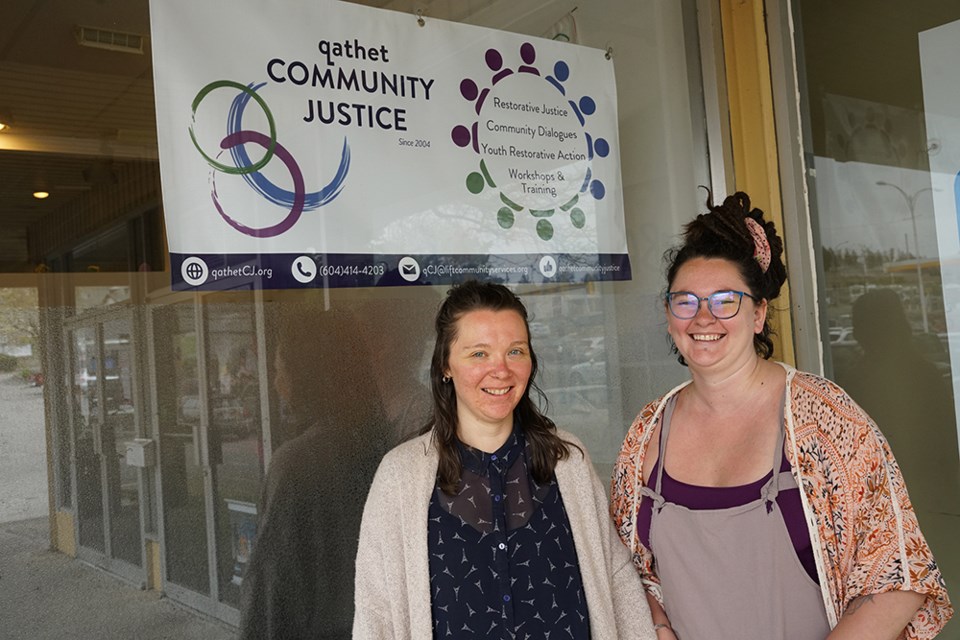Having received funds from the province, qathet Regional District and City of Powell River, qathet Community Justice (qCJ) are working to restore relationships where conflict or crime has caused harm.
qCJ program coordinator Siobhan Brown said it is a restorative justice organization, focused on trying to help people repair harms caused by conflict and crime by leading people through a facilitated dialogue.
“We get referrals from anyone in the community, who can self-refer, and primarily, our criminal referrals come from the RCMP,” said Brown. “Essentially what happens is we’ll get the referral with the affected party and the responsible party.
“We’ll give them a call and have an initial suitability meeting to find out if they understand restorative justice and whether they agree to conduct themselves in a respectful way so that further harm isn’t caused. For the responsible party, it’s about whether they are taking accountability for what they’ve done.”
Brown said sessions are not like criminal court, where evidence is presented and efforts are being made to prove a case.
“We need the responsible party to take accountability and want to be here,” said Brown.
She said when cases are being heard, a circle process is used, built around the idea of consensus and as much equity as possible.
“We sit around in a circle and there will be two circle-keepers, or facilitators, and usually a case coordinator, and then there will be the participants – those who are directly affected, and at least one support person for each of the affected and responsible parties,” said Brown. “We have a talking piece, and when you are holding it, it’s your turn to talk and you can’t be interrupted, and when you are done, you can pass it to the next person in the circle.
“All of the sessions are done in rounds and it helps alleviate combative pressure. You’ve got to wait your turn.”
Brown said in putting together a restorative justice circle, rather than operating from a prescribed format, participants set their boundaries.
“It puts the power back into the hands of the participants,” said Brown. “They set the guidelines and we, as facilitators, make sure they follow the rules they set for themselves.”
Brown said cases take time and cases vary, but typically, it takes between three months and a year to conclude the cases, depending on how complicated they are. She added that the cases are not just criminal and can involve any kind of conflict. Neighbourhood issues are common.
“They can escalate a lot and people can take issues very seriously,” said Brown.
qCJ also has a youth program that meets at Brooks Secondary School. Brown said it’s a youth-led committee trying to decide how it wants to bring practices into the school.
“We just started meeting at Brooks this year and before that, volunteers did some preparatory work to build it up so youth could run their own program,” said Brown. “We’re doing our first youth-specific restorative justice training.”
Brown said cases could involve disputes or bullying.
“We want to give them the skills they need and if we get referrals from the school district or any other source, people will have been trained to work on the case,” said Brown. “It’s finding a peer-to-peer solution.”
Community partners help operation
Brown said qCJ has occupied office space at Crossroads Village for about a year and a half. She said they were lucky that the regional district and city provided grant funding last year to help pay for the office.
Before qCJ had office space it was operating with the help of community partners. If it had a circle, qCJ would ask for space in-kind, but finding the right space could be difficult, according to Brown. During COVID-19, it became much more restrictive, so having self-contained office space has been a huge asset.
“We’re busy right now and it’s good,” said Brown.
While she is a paid employee, the program is supported through the generous donation of time by volunteers.
“We have unbelievable volunteers,” said Brown. “Typically what happens is the referral comes to me and I determine suitability. I will then send an email to our volunteers with no personal information and the volunteers will come back and tell me if they are interested.”
When the teams are assembled, they take over the cases and Brown checks in with them and provides support if required. She conducts all of the evaluations when cases are done.
Participants have to want to be involved in the program, said Brown, and then it’s on them to follow through after a case has concluded at qCJ.
“We call it a resolution agreement,” said Brown. “The parties negotiate what they feel is fair, we write it all down and a member of the team will check in with the responsible party however often they decide.
“For the affected party, they need to feel like they’ve been heard and they get to express the impacts of whatever has happened, and they get to decide what works for them as a consequence. It’s not a punishment, it’s a consequence, and it has to be realistic, but they have a lot of power they might not have in other systems.”
To contact qCJ, call 604.414.4203, email [email protected] or go to qathetcj.org.



